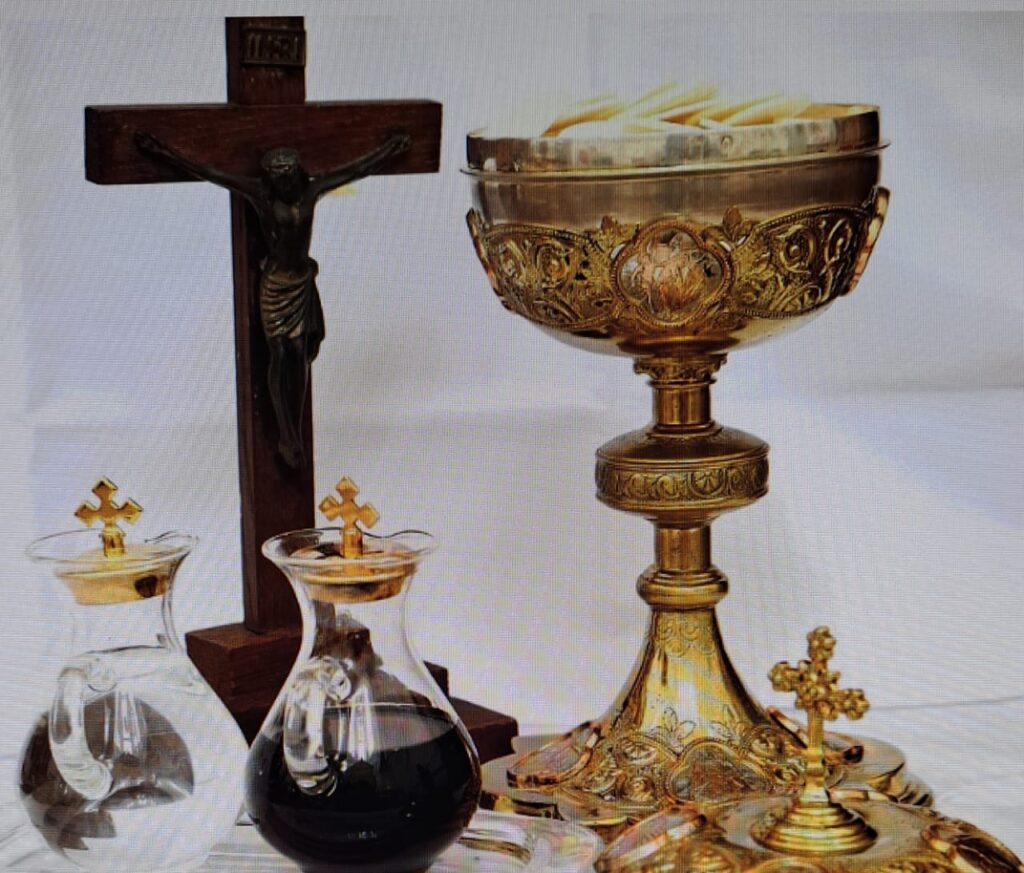The Holy Eucharist stands as our collective sacrifice, a sacred moment where God gathers us as one people under the leadership of our chief servant and priest. In the Eucharist, we bring our thanksgiving, petitions, and sacrifices before the Lord. Just as Melchizedek, the priest, and king of Salem, brought out bread and wine to bless Abram (Genesis 14:18-20), we, too, come before God with humble offerings of ourselves and the gifts of money or other items. Melchizedek’s gesture foreshadowed the ultimate sacrifice of Jesus Christ, who would later take bread and wine, blessing them and offering them as his Body and Blood. In every Eucharistic celebration, our invitation is to enter into this ancient tradition, a sacred lineage of blessing and thanksgiving that began long before the Last Supper and continues today as the heart of Catholic Christian worship (Sacrosanctum Concilium,1963, #10).
At the Last Supper, Jesus took bread and wine, common elements from the tables of ordinary people, and transformed them into extraordinary instruments of grace. As St. Paul reminds us in 1 Corinthians 11, Jesus instructed his disciples to “do this in remembrance of me,” commanding that this sacred meal continues to memorialize his life, death, and resurrection. This simple yet profound act echoes what we see in the feeding of the five thousand (Luke 9:11-17), where Jesus blessed the little items offered, and God multiplied them into an abundance. The people’s openness to share their bread created space for a miracle, showing that when we give generously, God provides beyond measure. The Eucharist, therefore, is not a private moment; it is a communal act of offering, thanksgiving, and trust in God’s power to bring life in abundance.
The multiplication points to an essential encounter and experience. St. Paul emphasizes that Jesus used bread and wine, not his physical flesh or blood in visible form, to communicate this mystery. Jesus chose ordinary food to reveal his extraordinary presence, and through the Church’s sacred teaching, we come to believe that these simple elements are no longer mere bread and wine, but the Body and Blood of Christ. This transformation, though imperceptible to the senses, is the heart of our faith in the Eucharist. As the SEQUENCE beautifully sings, faith must lead us beyond what our eyes see, to recognize that Jesus truly becomes present in this meal. It is a profound invitation to believe that Christ offers us life to the full through this sacred banquet, as he promised in John 10:10.
Therefore, brothers and sisters, the Eucharist should remain our memorial and a present reality, an active, living encounter with Jesus Christ who continues to nourish and transform his people. Mark what I will say next as crucial words on marble so you can never forget them. In the Eucharist, we come, like Melchizedek, to bless and to be blessed by God; like the disciples at the Last Supper, we come to receive and to remember; and like the crowds on the hillside, we come to share and to be satisfied. The Holy Eucharist binds us in faith, love, and a self-gift of communion. It calls us to step beyond the visible, to embrace the mystery, and to offer ourselves anew each time we gather, because, in this sacred feast, the Lord multiplies our offerings and feeds us with his very life, sustaining us until he comes again in glory.



